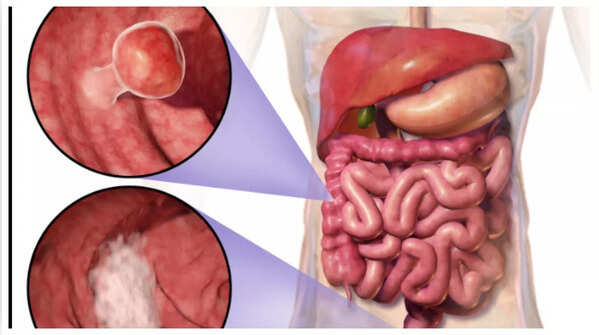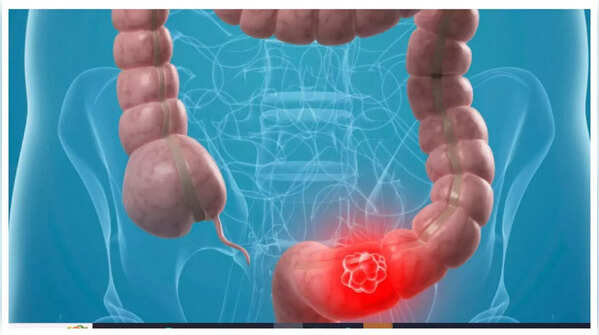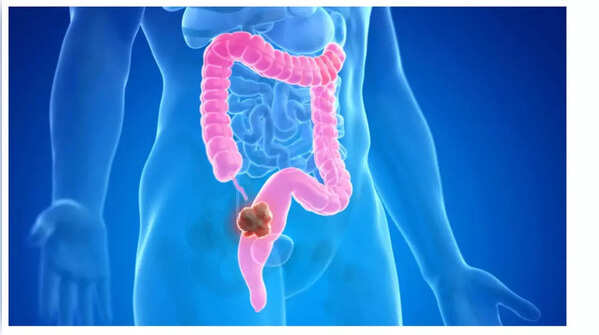Colon cancer, also known as colorectal cancer, originates in the colon or rectum. It frequently begins as benign polyps that can transform into cancerous growths over time. While most cases arise without clear predisposing factors, family history, obesity, and lifestyle choices can elevate the risk. The majority of diagnoses occur after age 50, and early symptoms can be subtle, often resembling digestive issues or stomach infections. However, certain warning signs warrant attention.

A significant indicator of colon cancer is a change in bowel habits. This can manifest as:
These alterations may seem insignificant or transient, often attributed to dietary changes, stress, or minor infections. However, persistent bowel changes lasting more than a few days or recurring frequently could indicate a growing tumor disrupting normal bowel function.

The presence of blood in the stool should always prompt medical evaluation, regardless of whether colon cancer is suspected. This symptom can appear as:
In some instances, bleeding may be minimal and undetectable without testing, potentially leading to anemia over time. While various conditions, such as hemorrhoids or infections, can cause blood in the stool, it is essential to rule out colon cancer, especially if the symptom is recurrent or accompanied by other concerning signs.

Ongoing abdominal discomfort represents another early symptom that individuals frequently overlook. This may include:
Such discomfort can be mistaken for indigestion or other minor digestive problems like constipation. However, if the pain is continuous and unrelated to dietary or lifestyle modifications, it could signal a tumor causing irritation or blockage within the colon.

Experiencing unusual tiredness or weakness without an obvious cause can be a subtle indicator of colon cancer, particularly when accompanied by other symptoms. This occurs because slow, undetected bleeding in the colon can result in iron deficiency anemia. The reduced number of red blood cells impairs oxygen transport, leading to fatigue, shortness of breath, and weakness. Although these symptoms may be dismissed as stress-related or due to insufficient sleep, medical evaluation is warranted.

Losing weight without conscious effort is a common symptom associated with many cancers, including colon cancer. When the body is actively fighting cancer, the immune system operates at an elevated level, and tumors can interfere with digestion and appetite. If you notice significant weight loss despite maintaining consistent dietary and exercise habits, consulting a healthcare professional is crucial. While this symptom often emerges later in the disease, it can occasionally serve as an early warning sign.

Disclaimer: This information is intended for educational purposes only and does not substitute professional medical advice. Always seek guidance from a qualified healthcare provider for any health concerns.
Sources:









Newer articles
Older articles
 Android Security Alert: Government Warns of Critical Flaws Exposing User Data
Android Security Alert: Government Warns of Critical Flaws Exposing User Data
 Bezos-Backed Methane-Tracking Satellite Mission Ends Prematurely After Loss of Contact
Bezos-Backed Methane-Tracking Satellite Mission Ends Prematurely After Loss of Contact
 Sanjog Gupta Named ICC's New Chief Executive Officer, Set to Lead Cricket's Global Expansion
Sanjog Gupta Named ICC's New Chief Executive Officer, Set to Lead Cricket's Global Expansion
 Greg Chappell: Rishabh Pant is Revolutionizing Cricket with Unorthodox Batting
Greg Chappell: Rishabh Pant is Revolutionizing Cricket with Unorthodox Batting
 Heart Attack Warning: 5 Subtle Signs to Watch for a Month Prior
Heart Attack Warning: 5 Subtle Signs to Watch for a Month Prior
 Staying Hydrated May Significantly Lower Risk of Heart Failure, New Study Finds
Staying Hydrated May Significantly Lower Risk of Heart Failure, New Study Finds
 Asia Cup 2025: ACC Eyes September Start Date Amid Growing Optimism
Asia Cup 2025: ACC Eyes September Start Date Amid Growing Optimism
 FIFA Club World Cup 2025: Upsets, Messi Magic, and Weather Woes Define Group Stage
FIFA Club World Cup 2025: Upsets, Messi Magic, and Weather Woes Define Group Stage
 Gavaskar Calls for Kuldeep Yadav's Inclusion in Second Test Amid Bumrah Fitness Concerns, Eyes Batting Reshuffle
Gavaskar Calls for Kuldeep Yadav's Inclusion in Second Test Amid Bumrah Fitness Concerns, Eyes Batting Reshuffle
 Doctor Reacts to Rishabh Pant's Somersault After Century: 'Unnecessary!' – Surgeon Who Aided Recovery Speaks Out
Doctor Reacts to Rishabh Pant's Somersault After Century: 'Unnecessary!' – Surgeon Who Aided Recovery Speaks Out